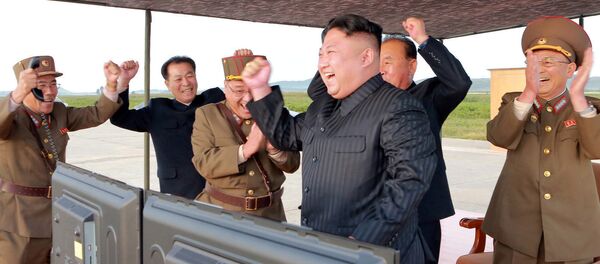The elegant and creatively named "No Unconstitutional Strike Against North Korea Act of 2017" would prohibit any executive funds from being used to strike the DPRK without the approval of Congress, according to a press release from Rep. John Conyers (D-MI), the ranking member of the House Judiciary Committee.
The bill would, however, make an exception if the strike was made to repel a sudden attack, to defend American allies in the region or to protect or rescue US personnel. Fifty-nine of the 61 co-sponsors are Democrats; only two Republican co-sponsors, Reps Thomas Massie (KY) and Walter Jones (NC), have signed on.
The bicameral bill was authored by Conyers as well as Sen. Edward Markey (D-MA) — both US military veterans — with the 88-year-old Conyers being one of two Korean War veterans currently serving in Congress. "As a veteran of the Korean War, I am ashamed that our commander in chief is conducting himself in a reckless manner that endangers our troops stationed in South Korea and our regional allies," Conyers said in the press release.
"That is why Congress is standing up today to ensure that this administration understands that the Constitution does not permit military attacks without congressional approval."
Instead, the bill calls for Trump and the White House to pursue a diplomatic resolution to the current crisis on the Korean Peninsula, which has seen an increasingly tense series of military buildups and exercises, as well as North Korean missile and nuclear tests.
The flames have been stoked by Trump's belligerent rhetoric, such as when, in a speech before the UN General Assembly, he threatened to "totally destroy North Korea" if the communist country attacked the US or its allies.
On Twitter, Trump wrote that North Korean leader Kim Jong-un "won't be around much longer," and in an August press conference Trump vowed to meet any future North Korean threats with "fire and fury the likes of which the world has never seen."
"During the campaign," Conyers said, "people feared a President Trump with the power to initiate a nuclear conflict — less than a year later, those fears are far too close to being realized. Trump must immediately cease talk of pre-emptive war and commit to the diplomatic path advocated by both American experts and the South Korean government."
The US Constitution gives Congress, not the White House, the power to declare war. Conyers' and Markey's letter cites the words of then-President George Washington in a 1793 letter to then-governor of South Carolina William Moultrie. "The Constitution vests the power of declaring War with Congress, therefore no offensive expedition of importance can be undertaken until after they shall have deliberated upon the subject, and authorized such a measure," Washington wrote.
However, pre-emptive strikes have typically been exempt from this separation of powers. The letter of the law, the War Powers Act of 1973, gives the president the power to use military force so long as he notifies Congress within 48 hours of the commitment and the operation lasts 60 days or less.





